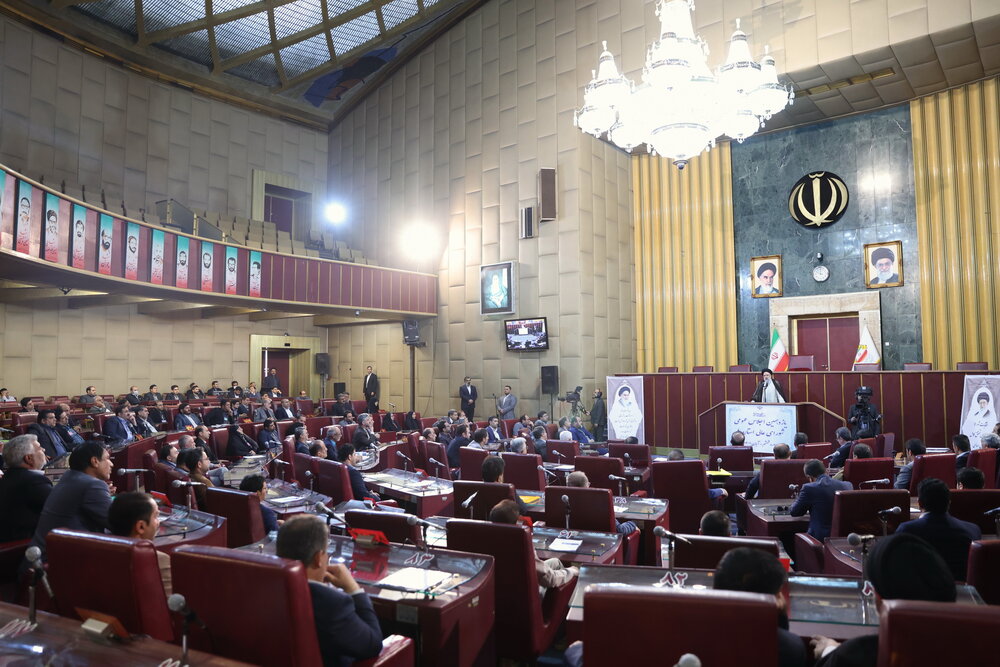Raisi says Iran won in the war of wills

TEHRAN- Iranian President Ebrahim Raisi has labeled participants in the international negotiations with Iran to resurrect the 2015 nuclear agreement, also known as the JCPOA, as traitors.
Speaking at the meeting of the supreme council of provinces in Tehran on Saturday, Raisi stated, "We are dealing with unfaithful people who readily violate commitments, stomp (on others' rights), and oppress others."
Despite the fact that the International Atomic Energy Agency (IAEA) has confirmed Iran's compliance with the accord 15 times, the parties to the JCPOA have started to voice concerns about Iran's adherence to the pact, Raisi lamented.
He declared that Iran will keep fighting against an imperialistic system devoid of morals.
The president also said that the city and village councils hold a special place in the constitution.
"The constitution has introduced council of cities and villages as one of the important pillars of decision-making in order to strengthen the republic system and the principle of paying attention to the will, desire, and participation of the people in decision-making."
The president also pointed to the role of the councils in administering social and economic justice as well as fighting poverty, corruption, and discrimination, saying councils form the pillars of the constitution.
Raisi emphasized the importance of considering council opinions when establishing a city or approving provincial budget, saying "the council is not the authority that approves the budget, but it is the authority that declares opinion on the budget” in cities and provinces.
He added that administrating justice based on the examination of the spatial planning document is one of the other major aims of the councils. “One of the important goals of the councils is the implementation of justice. First of all, it is the government that is obliged to implement justice, and in the Popular Administration (the title of the Raisi government) we consider ourselves obliged to implement justice, but the councils must also follow the implementation of justice.”
“In the administration of justice, the councils not only should pay attention to their own neighborhood and city, but they should look at their own place on the one hand, and on the other hand, their place in relation to the region and the country,” Raisi remarked.
The president went on to say that the councils' views on the budget are significant. “The opinion of the councils from this point of view can be of great help to the government in drafting and to the Majlis (Parliament) in approving the budget bill.”
Raisi also drew attention to the repeated philosophical interpretations of utopia, saying, “Utopia is not necessarily a city, but any inhabited place where people live. What characteristics should this utopian city have? Here, the foundation stone of what can balance our city and village is rationality, spirituality, ethics and justice that should rule over every region of ours.”
’Enemy has restricted and sanctioned our specialists in every area they entered’“These are important ideals and goals that are mentioned in the constitution in some way and council members should always seek to deal with discrimination and corruption and the implementation of justice,” the president said, emphasizing that council members should abide by the moral and just laws of the constituency they represent.
The president stressed the importance of not limiting employment to administrative tasks and desk jobs, saying, “Work in the field of production and services is very important and effective, and the councils should also supervise municipalities in this regard.”
Raisi emphasized the need for significant follow-up on reform issues, both in terms of structures and behavior in general, saying, “Honorable members of the councils should not consider doing reform matters as a step back in any way. It is important that the work and affairs of the people is done satisfactorily.”
In response to pleas to emphasize the importance of councils, the president said, "All institutions are required to recognize city and village councils" and that "councils are recognized under the constitution."
Elsewhere in his remarks, the president said, “The enemy has put a lot of obstacles in the way and has restricted and sanctioned our specialists in every area where they entered. Enemy has even prevented the supply of medicine needed by our patients. We have such an enemy that in the forty-three years that have passed since the revolution, it has always been trying to plot and sow sedition against our revolution and system.”
“The enemy wanted to stop the train of progress of Islamic Iran and we also wanted this train to move fast. This is a battle of wills. The enemy tried their best to realize their will, but they saw that, contrary to their wishes and efforts, Iran's oil exports reached the pre-sanctions levels,” the president underscored.
The government attempted to remove and neutralize the sanctions in two different ways, according to Raisi, who also stated that “the Popular Administration took fundamental steps to increase exports, complete half-finished projects, and implement pending laws and projects, such as the licensing system, which has been pending in the country for 13 years.”
The president went on to add, “The enemy tried to stop or slow down the movement of the government, but according to the interpretation of the Leader of the Islamic Revolution, the enemy saw that the country is progressing all-round, and the government does not rely on outsiders and does not wait for their smiles and frowns.”
He concluded, “Despite the enemy's aspirations, we can see the future clearly because of the pure blood of the martyrs and the efforts of those who serve day and night in our nation.”
Leave a Comment